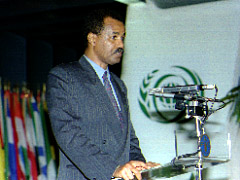


ERITREA - ERYTHREE | ||
His Excellency Isaias Afwerki, President of the State of Eritrea | ||

Allow me first to congratulate FAO, and particularly the Director-General, Dr. Jacques Diouf for focusing international attention on the vital issue of food security through this global Summit. The realization that world food security is a concern to all members of the international community, the commitments underlined in this Summit to strengthen cooperation at the regional and international levels through appropriate technology transfer, collaborative research and the sharing of investment experience and best practice, will no doubt go a long way to mitigating both temporal and structural food deficits in vulnerable countries. An integrated and holistic approach to enhancing global food security must surely address its multifaceted causes and linkages, especially the crucial problem of peace and stability. There is indeed overwhelming evidence, particularly in Africa, that structural food deficit and mass starvation are likely to occur and persist in areas afflicted by war and civil strife. The painful tragedy in Somalia and the crisis unfolding in Zaire today are perhaps the most recent and vivid illustrations of the urgency of dealing with the political causes that engender social chaos and hunger. Allow me at this juncture to digress a little from the main theme of my brief address to dwell on the current developments in Zaire to underscore the pitfalls inherent in misguided approaches that detract from confronting the fundamental causes in a comprehensive manner. When the crisis in Eastern Zaire began to assume grave proportions, the regional countries convened a Summit in Nairobi at the beginning of this month to consider ways and means of stabilizing the situation. The Nairobi Summit rightly identified the primary sources of the problem, recognizing the need for separating the bona fide refugees from the armed militias, and calling for the intervention of a neutral force to create a temporary sanctuary in Eastern Zaire in order to facilitate the voluntary repatriation of the refugees. The Nairobi declaration had, moreover, provisions for continuous dialogue and consultation between the regional leaders and the wider international community to help in the implementation of these objectives. The heavy-handed and unilateral measures of intervention that have apparently started to take place now, without any consultation with the regional leaders and due consideration of these issues, raise serious questions about the conduct of the international community in dealing with these problems. The intervention underway has no clear mandate or sense of mission. It has, moreover, been overtaken by events on the ground as the desired safe corridor has been opened in the past two days, allowing hundreds of thousands of Rwandan refugees to begin the long trek home. Indeed, what may be required now is the effective delivery of humanitarian assistance to the refugees in their home villages to enable them to get on their own two feet, not a massive and expensive military intervention. If agricultural production has declined steadily in the past 20 years to induce hunger and, at times, calamitous famine in our region in general and my country in particular, the primary cause has again been war and turmoil. Recurrent droughts, erratic rainfall patterns, poor agricultural techniques, inadequate infrastructure, fragmented markets and depressed economic development may all have compounded the problem to varying degrees. But these constraints are not insurmountable structural hurdles that cannot be harnessed through prudent policies. The resources that could be utilized to increase food security on a sustainable basis are in fact considerable, both at the individual country and collective sub-regional levels. These include several major rivers, fisheries and large numbers of livestock. With relatively modest capitalization, the opportunities for small-scale irrigation are promising. Current low levels of yields of traditional varieties could be increased substantially by modifying existing practices and introducing modern systems. Pooling resources at the sub-regional level to mitigate periodic disasters is expected to yield satisfactory results. It is to this end that the newly revitalized sub-regional organization, IGAD, has set this task as one of its key priorities. My Government accordingly perceives the crop shortfall that has characterized agricultural production in the country in the recent past as a transitory problem associated with the legacy and structural dislocation of war. In this spirit, my Government is committed to work vigorously to achieve national food security and to extricate the country from food aid dependency in the shortest time possible. This task will surely require a focused and purposeful external injection for a limited period of time, in addition to the mobilization of the requisite domestic resources. It is, moreover, vital that the external assistance provided be geared towards creating an enabling environment rather than contributing to a dependency syndrome. Unfortunately, this has not been the case in past years. Somehow the logic of food assistance remains entangled in obsolete rules and regulations that cumulatively contribute to perpetuate dependency. Bureaucratic inertia, very strong agricultural lobbies in the food surplus countries in the North and traditional donor-recipient relationships may offer at least partial explanation for this state of affairs. Whatever the full explanation, the fact remains that workable schemes and ideas that aim at curing the disease of dependency rather than addressing the symptoms, are rejected simply because they do not conform with the established practices and perspectives. As we ponder new ways and means for enhancing global food security, it is our belief that these practices will be reviewed critically to ensure that the limited support extended is purposeful and catalytic enough to engender sustainable domestic growth in the recipient country. Let me conclude my brief intervention by again thanking FAO for organizing this Summit and the Government of Italy for its warm hospitality. | ||
|
|
|
|

 |